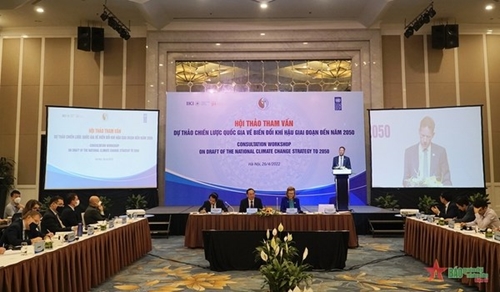Addressing the event, MoNRE Deputy Minister Le Cong Thanh said that the strategy comprises viewpoints, targets and solutions that are suitable to the country’s commitments at the 26th U.N. Climate Change Conference of the Parties (COP26) as well as requirements of Paris Agreement.
Thanh underlined that the strategy clarifies the roadmap to realize Vietnam’s commitments at COP26, as well as solutions that the country works out to reach the target of bringing net emissions to zero by 2050.
    |
 |
|
An overview of the conference |
He expressed his hope that international organizations and development partners will continue to support Vietnam during the implementation of the strategy, the nationally determined contribution (NDC) as well as solutions to realize the country’s commitments at COP26.
Caitlin Wiesen, UNDP Resident Representative in Vietnam, said that she hopes the long-term strategy will create a widespread and sustainable foundation for other important climate change related plans and policies.
She recommended that Vietnam build a coherent climate change law and speed up the implementation of adaptation measures, thus strengthening the resilience of the society, especially communities that are directly impacted by climate change. It is necessary to build a green and fair transition roadmap as well as transparent policies to follow public and private financial flows to support the implementation of green investment projects and programs, she said.
Meanwhile, Weert Börner, Chargé d'affaires of the German Embassy in Hanoi said that the strategy will make an important contribution to the national discussions on net-zero emissions, adding that the discussions should be continued after the strategy is approved by the PM in 2022.
He affirmed that the German Government is determined to continue supporting Vietnam in conducting necessary transformation process to reach net-zero emissions in a fair and sustainable directions.
The draft national strategy on climate change until 2050 aims to strengthen the country’s capacity to adapt to climate change, reduce the vulnerability and losses caused by climate change, and complete the target of net-zero emissions, while making full use of opportunities to speed up the transformation of the growth model, enhancing the resilience and competitiveness of the economy, and making positive and responsible contributions to international efforts in protecting the global climate.
To this end, the strategy gives a number of solutions, including developing infrastructure system serving climate change adaptation, and completing institutions and optimizing potentials and resources for climate change response.
Source: VNA